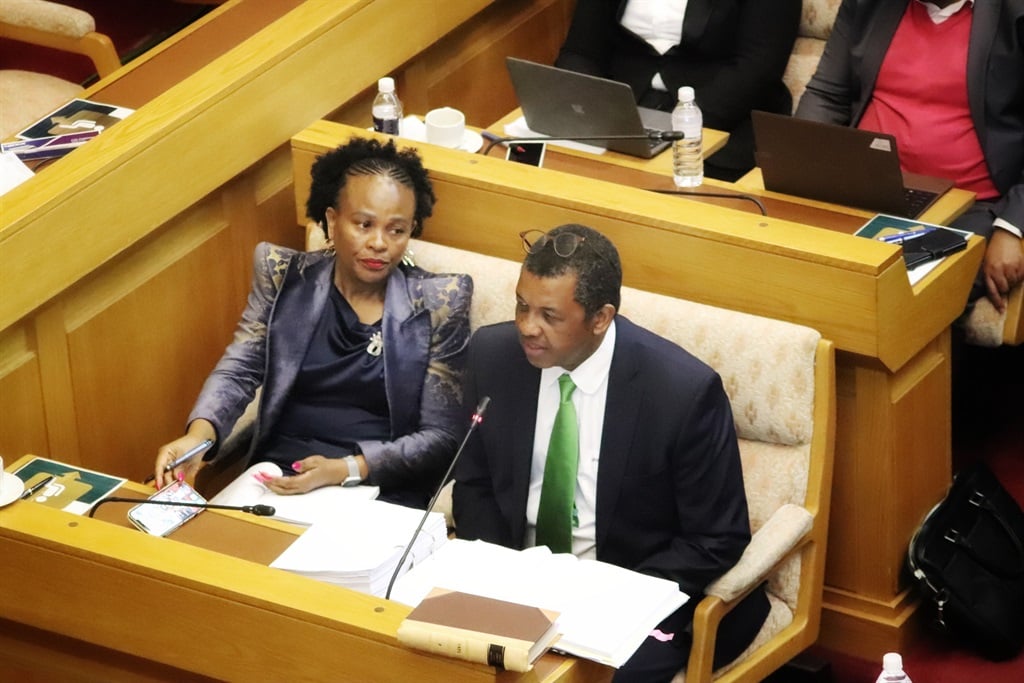
- The Western Cape High Court refused Public Protector Busisiwe Mkhwebane's application for leave to appeal and slapped her with a cost order.
- Mkhwebane wanted to appeal the decision, which prevents her from returning to office, to the Supreme Court of Appeal.
- A full Bench found this would be a waste of time and court resources, as the matter will be heard by the Constitutional Court on 24 November.
Beleaguered Public Protector Busisiwe Mkhwebane has been slapped with a costs order as her bid to go to the Supreme Court of Appeal to appeal against a Western Cape High Court ruling that prevented her from returning to her office failed.
The court found the SCA hearing the matter would be a waste of time and court resources. Last month, a full Bench of the Western Cape High Court - judges Lister Nuku, Matthew Francis and James Lekhuleni - handed down a judgment, asserting that the Constitutional Court must first confirm their order to overturn Mkhwebane's suspension by President Cyril Ramaphosa before it takes effect.
Mkhwebane approached the court for leave to appeal to the Supreme Court of Appeal, despite a hearing on the matter being set down for 24 November in the Constitutional Court, after the DA and Ramaphosa lodged appeals.
Arguing the application on Mkhwebane's behalf, advocate Dali Mpofu SC, doubled down on his assertion that the Constitutional Court needed not confirm the court's ruling setting aside Mkhwebane's suspension.
He characterised the other parties' arguments, which convinced the court that this was the case, as "clever lawyering", "legal gymnastics", and "smoke and mirrors".
"If this court fell for it, fine. Another court might not," said Mpofu.
He argued there were grounds for leave to appeal, as another court could come to a different conclusion.
The full Bench didn't agree. Its judgment, handed down on Thursday, reads: "We have carefully considered the submissions of the applicant [Mkhwebane] and the supporting respondents [UDM, ATM, PAC] but can find no redeeming features that persuade us that there is a reasonable possibility that another court would come to a different conclusion."
The court had another "compelling reason" to turn down Mkhwebane's application.
"If leave is granted to appeal to the SCA, it would have no practical result."
The court took note that the matter is set down for 24 November in the Constitutional Court.
"Thus, the Constitutional Court is seized with the pending applications and appeals which will finally determine the lawfulness of the applicant's suspension.
"In our view, granting leave to appeal in this case would lead to a piecemeal adjudication and delay the determination of the dispute. In addition, leave to appeal to the SCA in these circumstances would be impractical and a waste of public funds, time and judicial resources."
While the DA and Ramaphosa asked for a punitive cost order against Mkhwebane, the court found there wasn't any grounds that Mkhwebane conducted herself in a "reprehensible manner".
"Nonetheless, we find it concerning that notwithstanding that an expedited date has been determined by the Constitutional Court to dispose of all the issues raised in this application, the applicant and the supporting respondents nonetheless soldiered on with their applications for leave to appeal to the SCA," reads the judgment.
The court subsequently ordered that Mkhwebane, the UDM, ATM and PAC pay the DA and Ramaphosa's costs for two counsel.
This litigation stemmed from the 9 September ruling by the same judges that Ramaphosa's decision to suspend Mkhwebane was improper.
The suspension came a day after she announced her office would investigate him in terms of the Executive Members Ethics Act complaint over the 2020 break-in at his Phala Phala farm, and a day before the Western Cape High Court ruled on Mkhwebane's attempt to interdict such a move.
The court stated: "In our view, the hurried nature of the suspension of [Mkhwebane] in the circumstances, notwithstanding that a judgment of the full court was looming on the same subject matter, leads this court to an ineluctable conclusion that the suspension may have been retaliatory and, hence, unlawful."
After the DA launched an application to appeal that ruling to the Constitutional Court, thereby immediately suspending it, Mkhwebane brought an application for its immediate enforcement - which both the DA and Ramaphosa opposed.
The full bench dismissed this application and ordered Mkhwebane to pay most of the DA's legal costs.
The court agreed with both the DA and Ramaphosa that the president's decision to suspend Mkhwebane had to be referred to the Constitutional Court for confirmation "independent of any steps taken by any of the parties" - and, as such, that the law governing the immediate enforcement of orders "has no application" in this case.
The bench said Mpofu's arguments on behalf of Mkhwebane "misstates the law and is a gross mischaracterisation of the reasons underpinning the court's finding in this regard".

